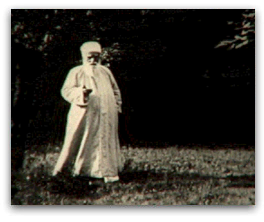Main menu
- ‘Abdu’l-Bahá’s Journey
- World Peace
- Stopping Racism in America
- Empowerment of Women
- More Principles...
- Prayer for America
Agnes: April 24 – Visit to Arlington Cemetery

Wednesday morning was given mostly to private interviews. At noon we drove to Arlington Cemetery. Just before we left the house I said to ‘Abdu’l-Bahá, “May I have a few of your roses and may I choose them?” intending to take the least beautiful ones. ‘Abdu’l-Bahá made the choice Himself, taking them out one by one, saying: “I will carry them.” While we were waiting for the carriage ‘Abdu’l-Bahá, Dr. Fareed, Mr. Remey, and I walked up 18th Street nearly to J Street. ‘Abdu’l-Bahá observed an electric motor on the other side of the street, stopped, remarked about it, and asked the price. As none of us possessed one, it was very amusing to hear how we groped around for the price finally Mr. Remey said he thought that they could be bought from $800 upward to $2000. ‘Abdu’l-Bahá said: “find out price” and with quick obedience Mr. Remey started across the street, but Dr. Fareed understanding better what ‘Abdu’l-Bahá meant said: “Not now” so Mr. Remey promised to get a price list. We then walked on and as we turned back saw the carriage approaching. When we reached Arlington we got out at the house and went through some of rooms, afterward sat outside – ‘Abdu’l-Bahá enjoying the softness and freshness of the air, laden with the odor of flowers and admiring the view in the distance, the domes of the Capitol and Library showing conspicuously.
At this time I spoke of Royall. ‘Abdu’l-Bahá said, “Royall should be with you.” When I told Him that Royal seemed happy at Dr. John George Gehring’s, He said: “Yes, the doctor makes him think so.” Furthermore, He said, that we should at present do all we can to make Royall happy that the trouble he has is secondary and will disappear when happiness and freedom are established. “If Royall wants you to go for a drive with him, go; if he wants his Father’s society, let Mr. Parsons be with him.” He said Royall should have companionship of young people: a young man and young lady who really care for him for companions. Nothing should be said to Royall about lessons or studying. “Royall’s education shall be a gift from God” said the Master: also that he should live in mild climate and be out of doors a great deal.
After this conversation we walked towards the entrance of the cemetery. On the way, as I passed the monument of General King, I said: “This is where my father’s best friend is buried.” ‘Abdu’l-Bahá took out a white rose and placed it in the monument. When we reached the graves of my Father and Mother, He divided the roses, placing them in the receptacles for flowers, then chanted a Tablet a large portion of which Dr. Fareed took down. On our way back to the carriage I said I feared I had made my mother [Elizabeth Royal, who had lived with the Parsons Family in Washington, D.C.] unhappy by trying to keep my thoughts from her, after she had passed away — I felt then that unless I did this, as she had had such an overwhelming affection for me while she was here, that the constant thinking on my part might hold her here and this I wanted to avoid. ‘Abdu’l-Bahá said I had done right not to sorrow that the spirit of another rejoices in the joy of the loved one — that it is wrong to allow ourselves to grieve for those who have passed away. “If friends go to live in another city, they do not like to hear that their friends are lamenting.”








